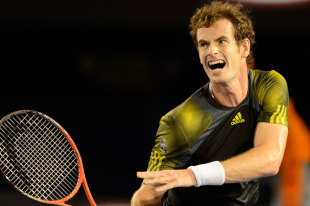- What The Deuce
Tennis seeking a cleaner face

There are all different kinds of "clean," and no sport covers more of the bases in that regard than tennis.
When was the last time you read about a tennis player charged with DWI? When was the last time a tennis player was arrested for toting a weapon more lethal than a Babolat Aeropro Drive? When was the last time the top athletes in another sport clamored for an improved drug-testing regimen?
This last point is a particularly interesting one, as London's Daily Mail and USA Today in recent days reported that the Grand Slam tournaments, the ITF and perhaps the ATP will increase their funding for anti-doping efforts by as much as 100 percent.
OK, you can fire back that the hunt for drug cheats has been woefully underfunded, and that testing for banned performance-enhancing substances has been distressingly sporadic.
According to USA Today, Dick Pound (former chairman of the World Anti-Doping Agency) described the 2011 financial commitment to the anti-doping effort by tennis powers as "very small."
The majority of the 2,150 doping tests performed in 2011 were simple urine tests (blood tests are more likely to expose sophisticated cheating, especially when it comes to blood doping), and only a meager 10 percent of those were out-of-competition tests (administered while the players were off the tour for any number of reasons).
It's not surprising that anti-doping has become a significant issue in tennis. After all, the spotlight in tennis is always on the individual, and you get a much closer look at him or her than an athlete in almost any other sport. Who hasn't heard someone else say, "Did you see so-and-so's biceps? He's got to be juicing!"
Speculation about doping in tennis is a veritable cottage industry among some skeptical fans, and there have been enough high-profile busts (dopers Mariano Puerta, a French Open finalist, and Australian Open champ Petr Korda leap to mind) to justify vigilance and stimulate suspicions that sometimes spill over into the realm of the wildly irresponsible. Tennis is no pure oasis in the desert of contemporary sports.
But what is unique about this new focus on anti-doping is that it wasn't driven in large part by an outcry among administrators, insiders and/or critics. The prime movers were the very top players, which helps explain why the reaction in the tennis establishment has been so swift.
Every member of the vaunted Big Four (ATP No. 1 Novak Djokovic, Roger Federer, Andy Murray and Rafael Nadal) has been vocal about the need to ensure that tennis be free of dopers.
Djokovic and Murray have been particularly vocal about their desire to keep tennis above reproach.
I have no particular urge to cast a cloak of righteousness over tennis. But it's interesting that, even in an era when most players no longer have the advantages of a formal education, tennis players mature into pretty grounded, well-adjusted, sophisticated individuals.
Many of them speak multiple languages. None of them are famous for lavish living. Gambling (or aiding and abetting gamblers) once seemed like a real threat in men's tennis, but that seems to have diminished.
The highly ranked players sometimes come across as prima donnas (and often are), but nobody ever had to make bail as a result of that character flaw.
The most interesting new development is that a "biological passport" program is in the works, and could be unveiled before the end of this year. The program reverses the entire approach to doping, because it will encourage players to demonstrate that they're clean (via regular testing that would expose any sudden spike or change in a player's biological profile), rather than trying to catch them cheating. Such a program would be a landmark for tennis, and underscore the extent to which the sport, despite shortcomings we won't go into here, is committed to doing the right thing.
We know that tennis isn't entirely clean; the record shows it. But unlike some sports, it seems to really, really want to be -- as demonstrated by the words and actions of the game's top stars.
This article first appeared on ESPN.com

